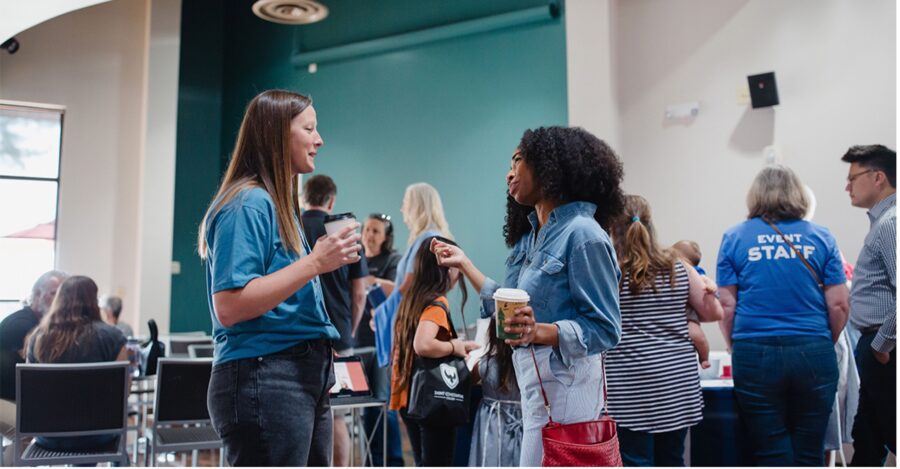Classical Conversations® Challenge B is the second level in our Challenge program. Whether you and your student are joining Classical Conversations for the first time at this level or have just finished Challenge A last semester, this post is a great place to discover the basics of what your child will learn in Challenge B.
An Overview of Classical Conversations Challenge B
This overview of Challenge B will cover the program’s respective student ages and grade level, theme, strands, and reading list.
Challenge B Student Ages and Grade Levels
Classical Conversations members with students ages 13 and up can enroll in the Classical Conversations Challenge B program. For reference, Challenge B is generally equivalent to 8th grade.
The Challenge B Theme
The theme of Challenge B is ownership builds discipline. In other words, students at this level have the opportunity to invest themselves in their studies, whether that’s demonstrated in asking good questions in discussions on community day, preparing and delivering presentations, or writing their very own short stories. If they work hard, diligent students can develop strong self-discipline that will set them up for success in future levels of the Challenge program.
The Challenge B Strands
The six strands — a classical education term for “skills” — of Challenge are logic, grammar, research, exposition, debate, and reasoning. As with all the other Challenge levels, Challenge B students practice these skills by studying quality content and discussing it with peers and a trained Licensed Director in their local community.
Logic
In Challenge B, students practice the skill of logical thinking by studying math. In particular, Challenge B students use the art of attending — one of the Five Core Habits of Grammar — to observe pre-algebra concepts, vocabulary, and equations using Saxon Algebra 1/2. Throughout the logic strand, Challenge students ideally come to recognize the presence of truth and beauty in math.
Grammar
In the Challenge B grammar strand, students practice the skills of memorizing and recalling by learning Latin vocabulary, declensions, and conjugations, picking up where they left off in Henle: First Year Latin at the end of Challenge A. There are many benefits to learning Latin, and in the grammar strand, Challenge B students are encouraged to practice attending to the details, especially when it comes to verbs and Latin translations!
The more we study Latin and the better we get at it, the more we will understand our own English grammar. The greater our understanding of English grammar, the better we are at deciphering our language and therefore of understanding more complex writing and the thoughts they communicate.”
– Leigh Bortins, The Question
Research
To practice their research skills, Challenge B students integrate science and history by studying astronomy and the origins of humanity and the universe. As they do, students consider one of the most important questions ever asked — “Is there a God who created and cares for us?”
In this strand of Challenge B, students research historic achievements by famous scientists throughout the centuries, presenting their research to their community through creative posters, charts, essays, and demonstrations. Then, toward the end of the second semester, students begin to learn the periodic table.
Exposition
Through reading Newbery literature and working through The Lost Tools of Writing, Challenge B students have the opportunity to grasp big ideas and write persuasively about them throughout the exposition strand. In the second semester, students each work on a long-term project of writing their own original short story.
In community, Challenge B students discuss novels and short stories, developing their critical-thinking and decision-making skills as they consider authors’ worldviews and characters’ choices.
Debate
In the Challenge B debate strand, students learn about famous Americans who have shaped our nation’s history through readings in The American Experience Storybook. They consider the values and virtues of these historical figures, weighing both the good and the bad.
In this strand, Challenge B students also participate in a Classical Conversations favorite — Mock Trial. This is a unique opportunity for students to begin understanding the rules and vocabulary of the American judicial system through a hands-on project. In teams, students work throughout the second semester to research, strategize, and debate a case as attorneys and witnesses before a mock jury and judge.
To learn more about Mock Trial, read the post “I Survived Mock Trial,” written by a Challenge B parent.
Reasoning
Finally, in the reasoning strand, Challenge B students practice discerning truth from falsehood by studying informal, formal, and propositional logic. While those are complex terms, the reasoning strand at this level, in essence, is aimed at encouraging students to hone their thinking skills and follow arguments step by step.
Read our post “Why Study Logic? Learning Outcomes and Teaching Advice” to discover the many benefits of learning logic.
Learning logic is a process; there are patterns to be discovered and rules to employ with impartiality. Following the correct procedure and asking the right questions will lead the student to the proper analysis of the argument every time. There is beauty in that objectivity, and irony that in this ‘rote study’ we can find truth.”
– Leigh Bortins, The Question
The Challenge B Book List
The Challenge B reading list includes resources to encourage students to develop personal and spiritual discipline. To view the Challenge B book list, visit our bookstore.
How to Enroll Your Student in Challenge B
Whether committing new Latin vocabulary to memory, solving pre-algebra equations, writing a short story, or debating an issue in Mock Trial, students in Challenge B often face challenges they’ve never encountered before. As a result, they are presented with the opportunity to own their education and develop self-discipline. In doing so, they can acquire skills that will prepare them for Challenge I through Challenge IV.
To learn more about or to enroll your student in the Classical Conversations Challenge B program, click here.




